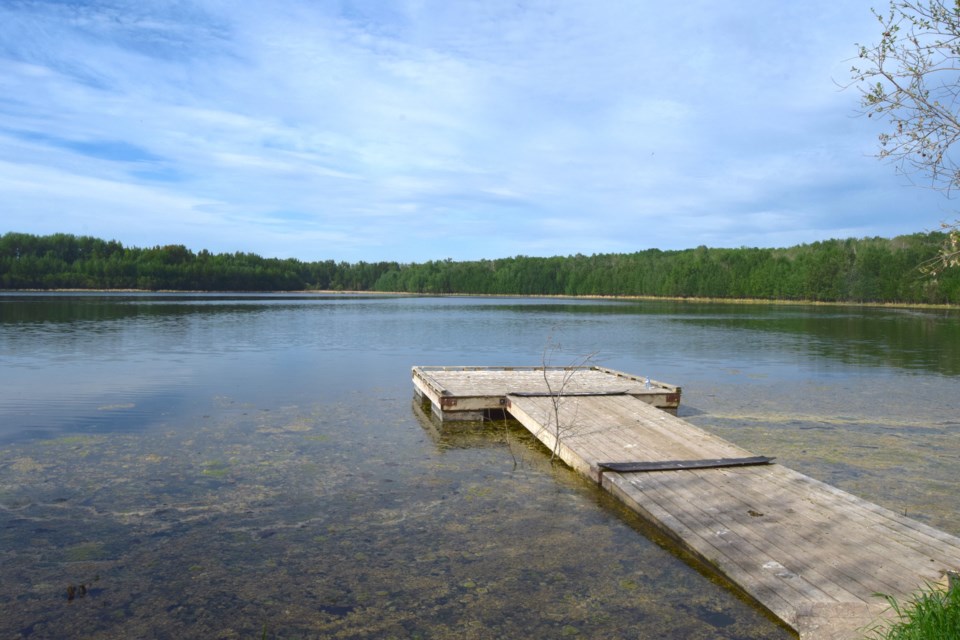BARRHEAD-County of Barrhead councillors decided to partner with an Alberta Conservation Association (ACA) project to aerate Peanut Lake, despite the potential of future continuing utility costs.
Councillors unanimously threw their support behind the project during their June 1 meeting after listening to a presentation from fieldman Kyle Meunier.
The ACA is a conservation group founded in 1997. Their purpose is to protect and enhance fish and wildlife populations and their associated habitats so that Albertans can enjoy them.
Meunier said the ACA approached the Agricultural Services Board (ASB) about two months ago telling them about their plans to aerate Peanut Lake.
Peanut Lake is about 15 minutes south of Barrhead. The county operates a 15 site campground there, complete with a small boat launch and fish cleaning facility.
"The purpose of this is to put more oxygen into the system to increase fish populations and prevent winter kill," he said, adding it is a stocked lake.
Central Alberta lakes are especially prone to winter kill due to eutrophic conditions and the decomposition of organic materials, which takes up available oxygen, thus killing fish populations. Meunier noted Peanut Lake is especially prone to winter kill, partly because of how shallow it is.
"The deepest point is 44 feet," he said.
Meunier added the ACA is asking the county to provide the labour for the installation and/or removal of the aeration equipment and any training needed. The ACA would supply the aeration equipment. To prevent the public from inadvertently walking on thin ice caused by the equipment's operation during the winter, they also want the county to install snow fencing around the installation area.
Work on the project would start this fall before freeze-up. The aeration equipment would be removed in the spring.
Meunier said the ACA has completed similar projects in other lakes, including Jackfish Lake in the County of Two Hills, to great success.
To power the aeration equipment, the ACA will bring electricity to the site, at their cost. However, in the future, the organization may ask the municipality to pick up the electricity bill, estimated to be about $4,000 annually.
Meunier noted to help offset the costs of the potential cost of the power bill, the county might be eligible for one of several grants the organization provides.
"At the ASB meeting, it was brought up that the request doesn't fall under our umbrella, but agriculture and environment go together hand-in-hand," he said.
County manager Debbie Oyarzun interjected that the request does fit into the municipality's Strategic Plan in that it promotes the responsible use and protection of natural resources.
"It also helps the county maintain its rural character and that it helps make it a desirable place," she said. "It also helps promote economic development through attracting tourism."
Reeve Doug Drozd supported the request but asked how ACA was funded, adding he believed part of its funding came from receiving a percentage of the sales of fishing and hunting licenses it sold for the province.
Walter Preugschas, who sits on the ASB board, said a large part of ACA's funding comes from corporate donations.
Preugschas also suggested they could reduce the bill to the county by using volunteer labour.
However, Meunier was reluctant to use volunteers due to potential liability issues.
"Kyle falling through the ice is better than a volunteer doing it," Drozd joked.
Coun. Darrell Troock suggested any labour costs should come from the money the county sets aside for projects when they receive money in place of municipal reserve lands.
Oyarzun agreed but noted that if the association asked the municipality to contribute to the utility costs, councillors would make the decision as part of its 2022 budget deliberations.
"With the growing demand for people looking for RV sites, our campsites are going to be a hidden gem," Troock said. "I'm whole heartedly in favour of this. These are the things that attract people to the area."
Drozd and Coun. Dennis Nanninga also added the benefits and potential future savings of having electricity extended to the area could be extensive.
"If and when it does come in, we can have it go through county property, so that we can access it for future development, street lights, washhouses, or whatever it is, that is a cost that someone else is paying for,” Drozd said.
Barry Kerton, TownandCountryToday.com



